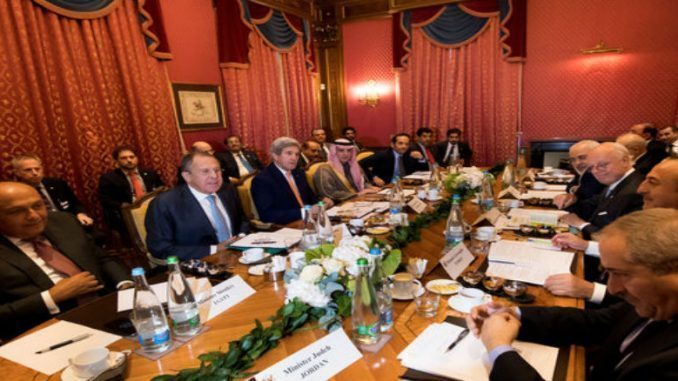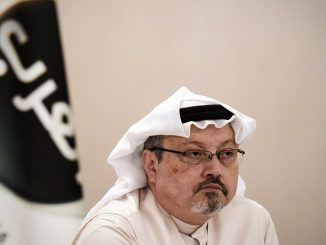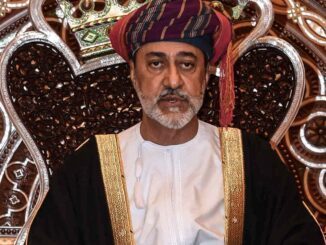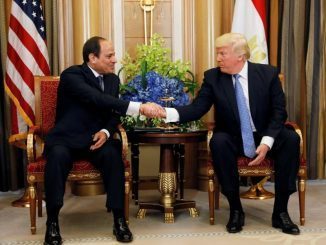
Vitaly Naumkin, Russia’s adviser to UN Special Envoy for Syria Staffan de Mistura, said that he did not rule out a possibility that the Arab countries, which were impacted by the Syrian crisis, could join the three guarantor states of the Syrian peace process, noting that Egypt could play a huge role in the start of the peace settlement, according to Sputnik.
In the same context, Egyptian Foreign Ministry spokesman Ahmed Abu Zeid stated that Egypt welcomes the resumption of the intra-Syrian talks and expresses readiness to facilitate the new round of negotiations under the UN auspices in Geneva.
Abu Zeid said, “Egypt being a member of the International Contact Group on Syria, looks forward to the resumption of the Syrian Peace talks under the UN auspices in Geneva and sees it very natural to participate in facilitating these talks.”
He also highlighted that Egypt, as a regional player, followed closely the January 23-24 talks in Astana brokered by Russia, Iran and Turkey and would continue its efforts to monitor and enforce the ceasefire in Syria.
Ahmed Abu Zeid, “Egypt, as an Arab regional country, followed up closely the talks in Astana. We support every effort that would enforce and stabilize the cease fire in Syria.”
He also stressed that Egypt called for a fully inclusive intra-Syrian process at the future rounds of negotiations. His statement came as the political opposition did not partake in the Astana talks, which were and brought together the representatives of the Syrian government and the armed opposition groups.
He added, “We believe that any upcoming talks between the Syrians should be comprehensive and inclusive of all Syrian factions that are not involved in any terrorist acts and are eager to reach political settlement to the crises in Syria.”
“The upcoming talks in Geneva is an important milestone to put an end to the humanitarian suffering in Syria and bring Syria back as a strategic pillar to Arab national security,” as stated by Abu Zeid.
On February 20, the next round of UN-mediated talks in Geneva is expected to take place. De Mistura said he would form the opposition delegation himself, should the opposition fail to do so by February 8.
In fact, Egypt has started to take part in Syria peace talks based on requests from Iran which insisted on Egypt’s participation in Lausanne conference in 2016.
Last October, The Guardian revealed leaked emails that which showed that Iran had requested the lobbying for Egyptian officials to attend the talks on the Syrian crisis in Lausanne conference.
The Guardian said that it has seen emails indicating that the Iranian foreign minister, Mohammad Javad Zarif, asked Kerry for Cairo’s team to attend the Lausanne talks. When the US secretary of state proposed six-nation talks to “see if a new reasonableness can manifest itself” in Syria, Zarif replied: “Why not Egypt too?”
Iran agreed to attend the talks only once it had secured places for the foreign ministers of Egypt and Iraq at the discussions, according to the Guardian.
In addition, a new batch of leaked audio phone calls were broadcasted by Mekameleen TV Channel for Egypt’s Foreign Minister Sameh Shoukry, while discussing recent events with al-Sisi, showed the reason behind Egypt’s participation in Syria Peace which was held in the Swiss city of Lausanne in October 2016.
Shoukry said in the leaked audio that John Kerry told him that Iran insisted on Egypt’s participation in the peace talks, “US Secretary of State John Kerry spoke to me about an hour and a half ago and proposed that I attend the Lausanne meeting,”
He added, “He told me clearly that Iranian Foreign Minister Jawad Zarif made it a condition that Egypt must attend.”
Egypt’s Foreign Minister told al-Sisi that he believes that,”the meeting will further complicate the relations with the Saudi Kingdom and that its better not to attend.” He also added,”Our participation has negative repercussions rather than positive ones.”
Shoukry added that Kerry had earlier excluded Egypt from the meeting, justifying the decision by saying that the talks were only for “parties that have military impact on the ground, and therefore they did not want to involve Egypt”.
Shoukry also said, “The invitation came after they initially decided not to invite us,” he added, “The Russians proposed inviting us but it was the Americans who initially objected. The Russians then did not insist.”
Egypt’s Foreign Minister said to al-Sisi that he thinks that Iran is taking advantage from the situation (he means the tensions in the Egyptian Saudi relations).
However, al-Sisi has accepted the invitation but he wanted Kerry to announce Egypt’s attendance in order not to uncover Iran’s insistence on Egypt’s participation.
Shoukry said he will “get Kerry to issue a statement in which he stresses that he extended the invitation. He continued, “We will also…issue a statement that I received the invitation from him.”
Accordingly, it seems that al-Sisi’s stance regarding the Syrian issue is closer to the Russian and the Iranian axis than that of the Saudi Kingdom.
It is worth to mention that relations between Cairo and Riyadh have soared due to the divergent foreign policies between both countries towards the Syrian crisis.
On October 8 2016, Egypt voted on the Russian-backed draft resolution on Aleppo in the United Nations security council has exposed an unprecedented rift between Egypt and its strongest Arab ally, Saudi Arabia.
The vote triggered the first public condemnation by the Saudis of the Egyptian regime, which they helped bring to power three years ago.
The Saudi criticism also coincided with cutting monthly discounted oil shipments to Egypt, a much-needed support for the country’s deteriorating economy.



